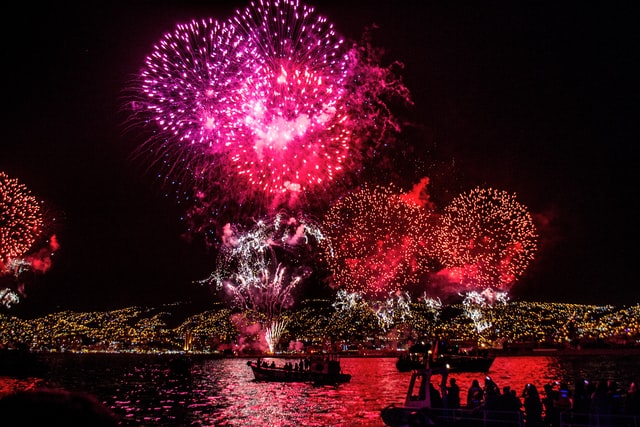Facing the Unsustainability of Public Events and Festivals

Photo by Alejandro Scaff on Unsplash
In this short post, Dr Vassilios Ziakas discusses whether the easing of COVID-19 restrictions will signal a safe return back to ‘normal’ in public events and festivals.
As COVID-19 restrictions are eased, we are all looking forward to the return of public events and festivals. But will this be a safe return back to ‘normal’ and full recovery or will this decision produce a dramatically new landscape?
Public events, rituals and celebrations are vital constituents in every society and civilisation since antiquity, mirroring and recreating social orders, constructing community and fostering shared values. Corporatisation transformed contemporary events to growth machines generating revenues and branding benefits. But this growth was disrupted by the pandemic. In post-pandemic times, instead of expecting a return to ‘normality’, it would be prudent to reflect on the state and evolving conditions of the event sector, also considering how related scholarship can help in its recovery.
Undoubtedly, the running of events as profit-generating engines caused serious dysfunctions. The sector has not been sustainable under the dominant neo-liberal regime in which there has been an unregulated free-market in creating events, huge competition bidding on events, investment in the biggest venues resulting in over-supply, and an emphasis on event tourism and place marketing that caused over-tourism in many cities. The pandemic crisis exacerbated the unsustainable state of the event sector and exposed its fragility. Existing intense competition for resources has been combined with diminishing demand and financial support resulting in structural change. Subsequently, events are changing, adapting their operations, programs and activities in line with broader economic and socio-cultural transformation.
It would be naïve to expect a full recovery based on modified delivery models such as reformatting events in virtual and hybrid environments. Deeper structural changes should be made to redress their diachronic unsustainability. Events and festivals are now more vulnerable than ever, but the need for socially and culturally meaningful events is likely to increase, especially if they are able to heal communities in the aftermath of the pandemic. In corporations and communities around the globe a serious re-think of goals, policies and strategies is already occurring due to a reduced capacity to subsidise and to produce events.
In this context, however, event-related scholarship provides little interdisciplinary analysis and guidance. It remains fragmented, focusing merely on different genres and isolated disciplinary approaches, while overlooking the innate limitation of events as sustainable agents. Events are temporal phenomena and their benefits are short-lived, so they are not compatible with sustainability, at least in terms of longevity. A common response is the notion of legacy, which so far has proved vague, unrealistic and misleading, serving primarily the interests of elites and political-rhetoric expediency. The solution here is to shift focus from individual large-scale events and their legacies to multiple periodic events in a community’s annual calendar with a variety of festivals that bestow-and-sustain benefits from one event to another, thereby making them a permanent structure to the service-ecosystem meeting local needs. The case of Edinburgh’s Fringe Festivals represents an illustrative example of how home-grown events driven by bottom-up initiatives established the city as one of the premiere festival destinations in the world – although there might still be problems with festivalisation and over-tourism, these can be more effectively addressed and resolved through locally-owned periodic events. Nonetheless, scholarship continues to focus on individual events and not programs of multiple events, thereby not being able to explore and assess the sustainability and health of event-hosting populations within their environments and their aggregate effects on social structures.
If there is one lesson drawn about events from the pandemic is that we have to face more systematically – and with more clarity – their unsustainability within the political, economic and socio-cultural environments in which are embedded as they adapt to new conditions. This makes it important to develop crisis management frameworks specific for events fostering their adaptability and resilience, a topic which is also neglected in event-related scholarship. These matters are addressed in a new edited collection that is the first book to explore (1) crisis management for events as an adaptation to turbulent change and (2) how, in turn, events come together to constitute the new structural landscape of the host areas. The pandemic is an opportunity for the event sector to be restructured and become more sustainable. If ‘The Times [...] Are a-Changin’, for better or worse, so too events have to change. The way forward requires a paradigm shift in how we view, study, treat and manage events.
Dr Vassilios Ziakas obtained his PhD from the University of Texas at Austin. His research cuts across sport and leisure policy with an emphasis on strategic planning, community development and sustainability. By employing an interdisciplinary lens his research currently explores strategic linkages among the sectors of sport, recreation, leisure, events, tourism and culture. Crisis Management and Recovery for Events: Impacts and Strategies (Vassilios Ziakas, Vladimir Antchak and Donald Getz) is out with Goodfellow Publishers.
